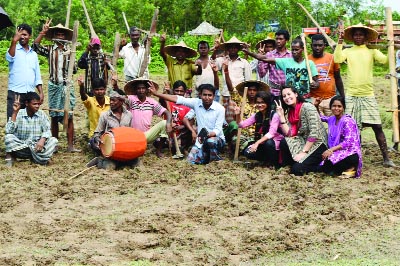
Md. Mosabbir Ali back from Chandpur tea garden :
Some festivals give us pleasure. Some festivals give the voice of the voiceless people.
In the same way tea garden workers observed Plough Festival on Monday afternoon.
Tea garden workers in the district’s Chandpur Tea Estate observed Plough Festival to mobilise support for their demonstration against the setting up of a Special Economic Zone (SEZ) there. Workers from Chandpur, Begumkhan and Jualbhanga tea estates in Chunarughat upazila gathered at Chandpur Tea Estate for a rally in the morning. They also stayed away from the work for two hours for the every straight day.
Tea workers sang including Chol Mini Asam Jabo Deshe Boro Dukh Re, Je Matir Buke Ghumiye Ache Lokhho Mukti Sena etc in the rally.
Gita Rani Kanu, President of Bangladesh Cha Sramik Nari Forum, said, “Our predecessors made this land cultivable by cutting hills and forests hundreds of years ago. There is a graveyard of our forefathers. How could we give away the land? We will rather die than leave it.”
“Generation to generations, we have been living here. Neither the government nor the tea company told us anything about an economic zone”.
Bhuttu Karmakar, an organizer of the programme, told.
“Many family members of workers don’t have jobs on the tea estate, so they survive by growing crops on spare land within the estate. Without this land, it would be impossible for workers and their families to survive,” he said.
A registered worker gets a meager 85 taka as a daily minimum wage, which ranks among the lowest in the world, said Surjo Kumar Bakti, president of Begumkhan tea garden unit under Tea labour Union.
The government’s attempt to introduce an economic zone is just another case of neglect and discrimination against tea workers, said Mohan Robidas, a student of Dhaka University from the community.
“We are Bangladeshi citizens and we have voting rights, yet we are among the most deprived people in the country. We have been living and cultivating on the land for over 150 years, but still we don’t have a place of our own,” he said.
Some festivals give us pleasure. Some festivals give the voice of the voiceless people.
In the same way tea garden workers observed Plough Festival on Monday afternoon.
Tea garden workers in the district’s Chandpur Tea Estate observed Plough Festival to mobilise support for their demonstration against the setting up of a Special Economic Zone (SEZ) there. Workers from Chandpur, Begumkhan and Jualbhanga tea estates in Chunarughat upazila gathered at Chandpur Tea Estate for a rally in the morning. They also stayed away from the work for two hours for the every straight day.
Tea workers sang including Chol Mini Asam Jabo Deshe Boro Dukh Re, Je Matir Buke Ghumiye Ache Lokhho Mukti Sena etc in the rally.
Gita Rani Kanu, President of Bangladesh Cha Sramik Nari Forum, said, “Our predecessors made this land cultivable by cutting hills and forests hundreds of years ago. There is a graveyard of our forefathers. How could we give away the land? We will rather die than leave it.”
“Generation to generations, we have been living here. Neither the government nor the tea company told us anything about an economic zone”.
Bhuttu Karmakar, an organizer of the programme, told.
“Many family members of workers don’t have jobs on the tea estate, so they survive by growing crops on spare land within the estate. Without this land, it would be impossible for workers and their families to survive,” he said.
A registered worker gets a meager 85 taka as a daily minimum wage, which ranks among the lowest in the world, said Surjo Kumar Bakti, president of Begumkhan tea garden unit under Tea labour Union.
The government’s attempt to introduce an economic zone is just another case of neglect and discrimination against tea workers, said Mohan Robidas, a student of Dhaka University from the community.
“We are Bangladeshi citizens and we have voting rights, yet we are among the most deprived people in the country. We have been living and cultivating on the land for over 150 years, but still we don’t have a place of our own,” he said.

